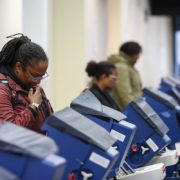— Jack Burkman, Jacob Wohl, CBS Detroit
CBS Detroit – Michigan Attorney General Dana Nessel is charging in what others call “right-wing provocateurs” after they set up a racist robocall that went out to thousands of Detroiters. As we reported back in August, Jacob Wohl and Jack Burkman are accused of allegedly sending out misinformation concerning the general election.
According to the Detroit News, the robocall seeks to discredit Detroit voters from mailing in their votes. Doing so would place them in a database the government and private companies would use to track them down for warrants or debt. The robocall recording claims that mailing in your vote would be used by the CDC to track people down for a mandatory vaccine. “Don’t be (inaudible) into giving your private information to the man. Stay safe, and beware of vote by mail,” concluded the recording.
— Credits & Context
Featured Image: Courtesy of Attorney Ben Crump
Full article @ CBS Detroit
Voting Rights Act of 1965
The Voting Rights Act of 1965 is a landmark piece of federal legislation in the United States that prohibits racial discrimination in voting. It was signed into law by President Lyndon B. Johnson during the height of the civil rights movement on August 6, 1965, and Congress later amended the act five times to expand its protections. Designed to enforce the voting rights guaranteed by the Fourteenth and Fifteenth Amendments to the United States Constitution, the act secured the right to vote for racial minorities throughout the country, especially in the South. According to the U.S. Department of Justice, the act is considered to be the most effective piece of federal civil rights legislation ever enacted in the country.
The act contains numerous provisions that regulate elections. The act’s “general provisions” provide nationwide protections for voting rights. Section 2 is a general provision that prohibits every state and local government from imposing any voting law that results in discrimination against racial or language minorities. Other general provisions specifically outlaw literacy tests and similar devices that were historically used to disenfranchise racial minorities.
The act also contains “special provisions” that apply to only certain jurisdictions. A core special provision is the Section 5 preclearance requirement, which prohibits certain jurisdictions from implementing any change affecting voting without receiving preapproval from the U.S. attorney general or the U.S. District Court for D.C. that the change does not discriminate against protected minorities. Another special provision requires jurisdictions containing significant language minority populations to provide bilingual ballots and other election materials.
Section 5 and most other special provisions apply to jurisdictions encompassed by the “coverage formula” prescribed in Section 4(b). The coverage formula was originally designed to encompass jurisdictions that engaged in egregious voting discrimination in 1965, and Congress updated the formula in 1970 and 1975. In Shelby County v. Holder (2013), the U.S. Supreme Court struck down the coverage formula as unconstitutional, reasoning that it was no longer responsive to current conditions. The court did not strike down Section 5, but without a coverage formula, Section 5 is unenforceable.
Source – Voting Rights Act of 1965 (Updated: 20 September 2020) Wikipedia. Available at https://en.wikipedia.org/wiki/Voting_Rights_Act_of_1965, (Accessed: 01 October 2020)

